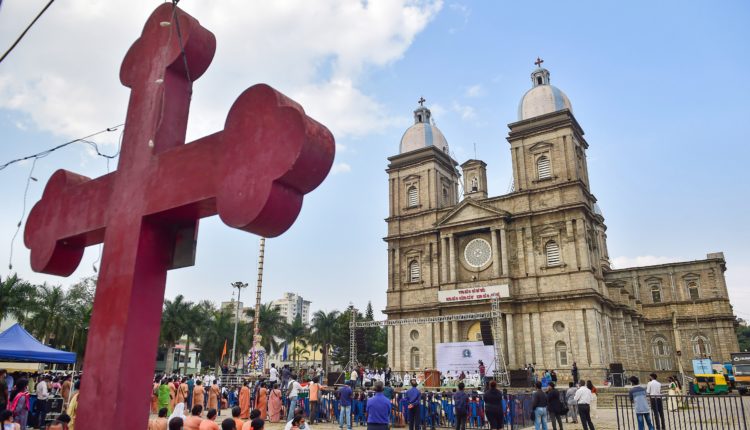
Bommai govt tables anti-conversion bill in Assembly amid protests

Amid protests, Karnataka’s ruling BJP on Tuesday introduced a contentious anti-conversion bill that proposes three to 10 years’ imprisonment for “unlawful conversion” from one religion to another besides making it mandatory to declare 30 days in advance to the district magistrate before changing one’s religion.
The proposed legislation, which has been in the works since September, has attracted the ire of opposition parties and the Christian community, which is fearful of harassment by self-styled vigilantes. Over the past few weeks, several instances of right-wing groups targeting churches in various parts of the state have been reported.
According to the Karnataka Protection of Right to Freedom of Religion Bill, 2021, “any converted person, his parents, brother, sister or any other person who is related to him by blood, marriage or adoption or in any form associated or colleague” is competent to lodge a complaint about the conversion.
The bill is likely to be taken up for discussion in the Assembly on Wednesday.
The BJP is keen to pass the bill in the ongoing legislature session, which ends on December 24, even though it may face stiff opposition in the upper house where it lacks a majority.
Also read: Karnataka Cabinet approves controversial anti-conversion bill
Heated arguments broke out in the Assembly soon after lunch break on Tuesday when Home Minister Araga Jnanendra introduced the bill, with Leader of the Opposition Siddaramaiah accusing the government of bulldozing the House and tabling the bill by stealth because the opposition members were not present at the time. “We have clearly made it known that we will introduce the Bill in the house,” countered Law Minister J C Madhuswamy.
Calling it a “draconian” law and a violation of Article 25, Siddaramaiah questioned the government’s priorities amid pressing issues such as farm distress following excessive rains. Similar legislations in states such as Uttar Pradesh have been challenged in courts, he said.
“No person shall convert or attempt to convert, either directly or otherwise, any other person from one religion to another by use or practice of misrepresentation, force, undue influence, coercion, allurement or by any fraudulent means or by any of these means or by promise of marriage, nor shall any person abet or conspire such conversion,” reads the text of the bill.
“Provided that if any person reconverts to his immediate previous religion the same shall not be deemed to be a conversion under this Act.”
Also read: Will not allow Karnataka government to pass anti-conversion Bill: Siddaramaiah
According to the bill, the burden of proof lies on ‘the person who has caused the conversion and on the abettor who aids or abets such conversion.’
The bill proposes punishment of three years imprisonment, which can extend to five years for unlawful conversions; up to 10 years when it involves a minor, a woman, a person of unsound mind or a person belonging to a Scheduled Caste or Scheduled Tribe. In case of mass conversions as well, the jail term may extend to 10 years.
The bill applies the term ‘mass conversion’ when two or more persons are converted.
“Even without an anti-conversion law the attack on the Christian minorities has been a weekly affair. Such a bill is likely to only make matters worse for the Christian community by giving a carte blanche for excesses by vigilantes,” the human rights organisation People’s Union for Civil Liberties said last week while releasing a report documenting 39 instances of attacks on Christians in Karnataka between January and November.
The anti-conversion debate came up in September when a BJP legislator, Goolihatti Shekhar, claimed in the legislative assembly that a large number of forced conversions had been taking place in his constituency and that his mother too was among those who had converted to Christianity. But the district administration, which inquired into the allegation, did not report any instances of people being forced to convert.
The government has so far has not provided specific figures about religious conversions.
“In recent years the State has noticed many instants of conversion by means of ‘allurement’, ’coercion’, ’force’, ‘fraudulent means’ and also ‘mass’ conversion. These instances caused disturbance of ‘public order’ in the State,” according to the statement of object and reasons for the Bill. “At present no legislation is in existence in the State to prevent such instances which cause disturbance to public order and to punish such persons indulged in such acts.”
Christian groups have been pointing out that an anti-conversion law would infringe the rights of the minority communities. Besides, they point out that the population of Christians has only been declining over the years. “If the allegations of rampant conversion across the state is true, why then has the number not increased beyond 1.87 percent as per the last census figures,” the Archbishop of Bangalore Peter Machado had asked in a statement in October.

